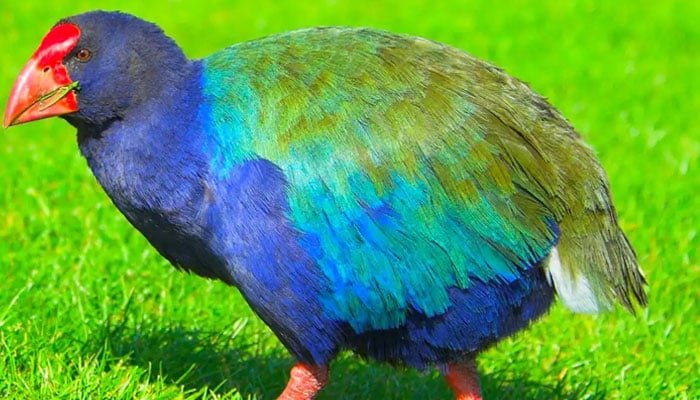Extinct since 1898: Takahe bird returns to New Zealand wilderness
Takahe has a robust build, striking red beaks, sturdy legs, and vibrant blue-green plumage
The Takahe, a sizable flightless bird previously presumed extinct since 1898, has made a comeback to New Zealand's South Island, The Guardian reported.
This remarkable reoccurrence is the result of conservation efforts that recently saw 18 Takahe released into the alpine expanse of Lake Wakatipu Valley.
This strategic intervention seeks to bolster the existing small population of these prehistoric avians in their natural habitat.
Takahe, characterised by their robust build, striking red beaks, sturdy legs, and vibrant blue-green plumage, possess a stature of nearly 50 centimetres.
Their historical presence is deeply woven into New Zealand's ecosystem, tracing back to the prehistoric Pleistocene era, substantiated by fossil remnants.
Despite their antiquity, Takahe holds unique breeding behaviours. Annually, they rear one to two chicks and has a lifespan of up to 18 years in the wild and 22 years in sanctuaries. Their diet predominantly comprises starchy leaves and seeds.
Two Takahe, Waitaa and Bendigo, were introduced to an existing pair, signifying a concerted endeavour to establish new wild populations of native species. The native birds of New Zealand evolved in an era prior to the prevalence of mammals, rendering them susceptible to predation by non-native land predators introduced by human settlers.
Deidre Vercoe of the Department of Conservation (DOC) affirmed the significance of this conservation milestone, emphasizing both the rewards and challenges in nurturing burgeoning wild populations. Establishing such populations necessitates time and meticulous strategy to safeguard the birds' future prosperity.
The revival of the Takahe, from apparent extinction to a hopeful resurgence, embodies the dedication of conservationists and marks a pivotal moment for safeguarding the ecological heritage of New Zealand's South Island.
-
Scientists discover rare form of 'magnets' that might surprise you
-
Humans may have 33 senses, not 5: New study challenges long-held science
-
Northern Lights: Calm conditions persist amid low space weather activity
-
SpaceX pivots from Mars plans to prioritize 2027 Moon landing
-
Dutch seismologist hints at 'surprise’ quake in coming days
-
SpaceX cleared for NASA Crew-12 launch after Falcon 9 review
-
Is dark matter real? New theory proposes it could be gravity behaving strangely
-
Shanghai Fusion ‘Artificial Sun’ achieves groundbreaking results with plasma control record












